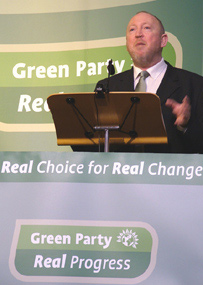|
This
website has been around since at least 2004 trying to tell the
electorate that we need to conserve. Although we are not politically aligned,
it is common sense to use energy from nature, to build eco friendly
houses and drive clean electric
vehicles. Many of the Green party's policies are well thought
through and for that reason we applaud their efforts.
A Green party is a formally organized political party based on the principles of Green politics. These principles include
environmentalism, reliance on grassroots democracy, nonviolence, and social justice causes, including those related to the rights of indigenous peoples. "Greens" believe that these issues are inherently related to ecological, social, and
human bodily health.

Eco
warrior - OK, I admit it!
Definitions
The distinction is very often made between "green parties" (lower-case letters) and "Green Parties" (capital letters). Any party, faction, or politician may be labeled "green" if it emphasizes environmental causes. Indeed, the term may even be used as a verb: it is not uncommon to hear of "greening" a party or a candidate.
In contrast, formally organized "Green Parties" follow a coherent ideology that includes not only environmentalism, but also other concerns such as social justice, consensus decision-making, and pacifism. Greens believe that these issues are inherently related to one another. The best-known statement of Green values is the Four Pillars of the Green Party, adopted by the German Greens since their founding in 1979-1980.
In some countries, notably the United
States, Ireland and France, there are or have been multiple parties with differing platforms naming themselves Green. Many people also confuse Green Parties with
Greenpeace, a global Non-governmental organization prominent in the ecology movement, which like the Green political movement was founded in the 1970s, and shares some green goals and values, but which works with different methods and is not organized as a political party.
Dark greenor survival politics represents the philosophical opposite of 'Growth'
David
Cameron's budget shambles - Youtube
Influence
The first Green Party to achieve national prominence was the German Green Party, famous for their opposition to nuclear power, as an expression of anti-centralist and pacifist values traditional to greens. They were founded in 1980 and have been in coalition governments at state level for some years. They were in federal government with the Social Democratic Party of Germany in a so-called Red-Green Alliance from 1998 to 2005. In 2001, they reached an agreement to end reliance on
nuclear power in Germany, and agreed to remain in coalition and support the
German government of Chancellor Gerhard Schröder in the 2001 Afghan War. This put them at odds with many Greens worldwide but demonstrated also that they were capable of difficult political tradeoffs.
In Finland, in 1995, the Finnish Green Party was the first European Green party to be part of a national Cabinet. Other Green Parties that have participated in government at national level include the Groen! (formerly Agalev) and Ecolo in Belgium and Les Verts in France. In the Netherlands GroenLinks ("GreenLeft") was founded in 1990 from four small left-wing parties and is now a stable faction in the Dutch parliament. In
Ireland, the Green Party represented by 6 members of parliament or TDs, form part of a coalition government. Here they have two Cabinet seats and also a junior ministry.
Around the world, there has been an explosion of Green Parties over the last thirty years. Green Parties now exist in most countries with democratic systems: from Canada to Peru; from
Norway to South Africa; from Ireland to Mongolia. There is Green representation at national, regional and local levels in many countries around the world. Even in some countries without democratic systems, there are now Green NGOs: for instance, in China there is Green-Web. Links to all the Green Parties around the world can be found at
www.globalgreens.info.
Most of the Green Parties are formed to win elections, and so organize themselves by the presented electoral or political districts. But that does not apply universally: The Green Party of
Alaska is organized along bioregional lines to practice bioregional democracy.

Scottish
Green Party logo
Alliances
Still, what defines green parties is respect for ecology and mimicry of its decentralized control (which operates by feedback, not rules). Depending on local conditions or issues, platforms and alliances may vary. In line with the goal of bioregional democracy, neighboring ecoregions may require different policies or protections.
Green Parties are often formed in a given jurisdiction by a coalition of scientific ecologists, community environmentalists, and local (or national) leftist groups or groups concerned with peace or citizens rights.
A Red-Green Alliance is an alliance between Green Parties and social democratic parties. Such alliances are typically formed for the purpose of elections (mostly in first past the post election systems), or, after elections, for the purpose of forming a government.
Some Greens find more effective alliances with spirit groups, or with more conservative groups (Blue-Green Alliance) or indigenous peoples — who seek to prevent disruption of traditional ways of life or to save ecological resources they depend on.
Alliances often highlight strategic differences between participating in Parties and advancing the values of the Green Movement. For example, Greens became allied with centre-right parties to oust the centre-left ruling PRI party of
Mexico. Ralph Nader, the 2000 presidential nominee of the US Greens, campaigned with ultra-conservative Catholic Pat Buchanan on joint issues such as farm policy and bans on corporate funding of election campaigns, although this "alliance" between Nader and Buchanan was very specifically limited to the purpose of showing that there was broad support for certain specific issues, across the political spectrum.
US Greens grew dramatically throughout 2001. However, stable coalitions (such as that in Germany) tend to be formed between elections with 'the left' on social issues, and 'the grassroots right' on such issues as irresponsible corporate subsidies and public ethics.
Recently, on 13 June 2007, the Irish Green Party / Comhaontas Glas agreed to go into a coalition government with Fianna Fáil, for the first time in their history. Fianna Fáil and the Green Party are joined by the Progressive Democrats in coalition and also enjoy the support of three independent members of parliament.

Venango
County, Pennysylvania, USA -
Green Party logo
Specific Green Parties
v • d • e Green Parties
Africa Benin, Burkina Faso, Cameroon, Guinea, Guinea-Bissau, Côte d'Ivoire, Kenya, Mali, Mauritius, Morocco, Niger, Nigeria, Senegal, Somalia, South Africa,
Americas Brazil, Canada, Chile, Colombia, Dominican Republic, Mexico, Nicaragua, Peru, Puerto Rico, St. Vincent & the Grenadines, United States,
Asia-Pacific Australia, Iran, Israel, Japan, Mongolia, New Caledonia, New Zealand, Nepal, Papua New Guinea, Pakistan, Philippines, Polynesia, Saudi Arabia, South Korea, Sri Lanka, Taiwan, Vanuatu,
Europe
(EGP, FYEG) Albania, Andorra, Austria, Belgium (Flanders and Brussels), Belgium (Wallonia and Brussels), Bosnia and Herzegovina, Bulgaria, Cyprus, Czech Republic, Denmark (the Greens), Denmark (Socialist People's Party), England and Wales (Wales), Estonia, Finland, France, Georgia, Germany, Greece, Hungary, Ireland, Italy, Kosovo, Latvia, Luxembourg, Malta, Moldova, Montenegro, Netherlands (The Greens), Netherlands (GreenLeft), Northern Ireland, Norway, Poland, Portugal, Romania (Ecologist Party), Romania (Green Party), Russia, Scotland, Serbia, Slovakia, Slovenia, Spain, Spain (Catalonia), Sweden,
Switzerland, Turkey, Ukraine
Green Parties in North America and Oceania
In most North America and Oceania, Green Parties face electoral systems that have traditionally disadvantaged smaller parties. Nevertheless, they have achieved national or state Parliamentary representation in New Zealand and Australia. In New Zealand the Green Party of Aotearoa currently holds 6 parliamentary
seats. The Australian Green Party holds seats in the Australian Senate and in the legislatures of five states and one Territory. Greens also hold representative positions in local government across the United States,
New Zealand and Australia (where a number of local government authorities are controlled by Green councilors).
Two provinces of Canada, British Columbia and Ontario, have strong provincial Green Parties. The Green Party of Canada is currently growing - it received 4.3% of the popular vote in the 2004 federal election and its support and influence continues to rise, largely due to new Canadian laws that are more favourable to the growth and funding of smaller parties (political parties get $1.75 per vote per year as long as they achieve minimum 2% of the popular vote). Its support solidified in the 2006 federal election when it captured 4.5% of the popular vote. Polls conducted in February 2007 placed support for the federal Green Party as high as 13%.
In the United
States, At least 226 Green Party members hold elected positions at the local level as of June 2007, including 55 in California.
Proportional representation has strengthened the position of the Australian Greens and the Green Party of New Zealand and enabled them to participate directly in legislatures and policy-making committees. In countries following British-style 'first past the post' electoral rules, Green Parties face barriers to gaining federal or provincial/regional/state seats. As of the end of 2002, there were no Greens in the elected houses of the national legislatures of the United States or Canada. Accordingly, in these countries, Green Parties focus on Electoral reform.

The
Green Party, mother nature's green color of peace
Green Parties in Europe
The first green parties were founded in Europe in the 1980s, following the rise of environmental awareness and the development of new social movements in the 1970s. One of the strongest Green parties in Europe is the Alliance '90/The Greens, which founded in 1980. This party has played an important role in the formation of national-level Green parties in other countries such as Spain.
In 2004 the European Green Party (EGP) was founded, it is a pan-European party that unites most European Green parties. The Greens are a relatively small party in the European parliament with only 34 seats (out of 732). More than a third of these MEPs come from Germany. It has a long standing alliance with the
European Free Alliance (EFA), an alliance of "stateless nations", such as the Welsh nationalist Plaid Cymru. Together with three independents EFA-EGP have 42 seats and they are the fourth largest party in the European Parliament.
While on many issues European Greens practice the same policies, one issue divides European Green parties: the European Union. Some Green parties, like the Dutch GreenLeft, the Swiss Green party, the Irish Green Party/Comhaontas Glas and the German Alliance '90/The Greens, are Pro-European, the Green parties in Sweden and England and Wales are Eurosceptic.
Some Green parties have been part of governing coalitions. The first one was the Finnish Green League that entered government in 1995. The
Italian Federation of the Greens, the French Greens, the German Alliance '90/The Greens and both Belgian Green parties, the French-speaking Ecolo and the Dutch-speaking Agalev were part of government during the late 1990s. Most successful was the Latvian Green party, who supplied the Prime Minister of Latvia in 2004. The Swedish Green party was a long term supporter of the social-democratic minority government until the election 2006 when the social-democratic party lost. Recently, on 13 June 2007, the Irish Green Party / Comhaontas Glas agreed to enter coalition government.

BP's
Deepwater Horizon ablaze in the Gulf of Mexico
In Scandinavia, left-wing socialist parties have formed the Nordic Green Left Alliance. These parties have the same ideals as European Greens. However, they do not cooperate with the Global Greens or European Greens, but instead form a combined parliamentary group with the Party of the European Left, which unites communists and post-communists. There is one exception, in 2004 the MEP for
Danish Socialist People's Party has left the Nordic Green Left parliamentary group and has joined the Green parliamentary group in the European parliament. The Socialist People's Party is currently an observer at the European Green Party and the Global Greens. In the Estonia 2007 parliamentary elections, the Estonian Green Party won 7 percent of the vote, and a mandate for six seats in the country's parliament, the Riigikogu.
In some countries Greens have been unable to win any representation in the national parliament. Three reasons can be found for this. It includes countries with a first past the post electoral system, such as the United Kingdom (although the Scottish Green Party has had success in the devolved
Scottish Parliament). In countries where a party with similar ideals is stronger, such as Norway and Denmark, Green parties tend to perform worse. In some Eastern European countries, like Romania and Poland, Green parties are still in the process of formation and have therefore not gained enough support. The Green Party of Bulgaria is a part of the ruling left-wing Coalition for Bulgaria. It has no parliamentary representation but it does supply one Deputy Minister in the government of Prime Minister Sergey Stanishev.
The European Green Party has worked to support weak Green Parties in European countries. Until recently, they were giving support to Green Parties in the Mediterranean countries. These Green Parties are now making electoral gains, e.g. in Spain and Republic of
Cyprus, or getting organized to do so, e.g. in Greece and Malta. Therefore the EGP is now turning its attention to Eastern Europe -- all these countries have Green Parties, but in materially-poor Eastern Europe the success of Green Parties is very
patchy.

Green Parties in the developing world
Green Parties in the developing world are often organized with help from those in other nations. As of 2002, most notably in
Africa.
Other than hosting the first Afghanistan peace conference as part of the German government, Green Parties in the developed world have made few concrete moves to spread their values using the diplomatic channels. This is usually seen as one of the responsibilities of the Green Movement — allowing parties concentrate on their voters. However, the leader of the Kenyan Green Party, Wangari Maathai recently won the Nobel Peace Prize, enhancing the image of Green parties across the third world.
In the greater Middle East region, a few Green political parties have been created, such as the Green Party of Pakistan since 2002, Green Party of Iran and the Green Party of Saudi Arabia, but many of these Green political parties are underground organizations due to the fact that they often conflict with Islamic law.
|
News
|
Issues
|
People
|
Young
Greens
|
Conference
|
Contacts
|
Policy
|
|
|
|
|
|

The
Green Party is steadily gaining in popularity. Provided their
policies are workable, there is no reason why they should not continue
to make gains. As with the new Lib Dems, it is unfortunate that a party
with dedicated policies concerning climate
chaos, have the least chance of being elected. I'm not being
nasty when saying this, just being a realist. What a pity when the UK is
committed to building zero carbon buildings by the year 2020.
How
are we going to achieve that when local councils don't know what time of
day it is. They are supposed to provide a rolling stock of land for
affordable/sustainable housing. When we've asked council's to show us
this land, we've not received an answer.
In
fact, although many thinking people are voting Green these days,
both the Liberal Democrats and now Conservative have realised this
topic is a vote getter. Regardless, more voters seem to be
in love with the petrol economy and don't want to, or cannot
afford to rock the boat. Yet we are
falling well behind with the targets we agreed during the Kyoto
and other Agenda 21 talks.

Nelson
Kruschandl says : "It's Time for Change"
A
look at PM's question time will confirm that
Not
that we are the worst country by any means, but when talk goes to
starting up another Nuclear drive, it is clear the
politicians are desperate, even after Fukushima they are still so
desperate they are prepared to put lives (humans and animals) at
risk from radiation leakage. The worst offender of all was the Bush
administration and its love affair with oil.
President Obama is still trying to shell out the deep sea drilling
licenses, but after the Deepwater Horizon - well. Unfortunately, I'm
not a politician, I'm an engineer - otherwise I'd be
campaigning. But who would have a chap in their party, when
he's likely to support unpopular party policies. Please see the
section below taken directly from the Lib Dem website.

Fukushima
nuclear power stations after the tsunami
LINKS
and REFERENCE

Green
Party logo Canada
Green
Party newsletters
-
http://www.elections.org.nz/elections/article_126.html
General elections 1996-2005 - seats won by party
-
http://greenparty.org.uk/international/international/81/gewd.htm
Text about the Green East-West Dialogue
-
http://www.europeangreens.org/peopleandparties/networks/gewd.html
The Green East-West Dialogue
-
http://europeangreens.org/news/update/updapril2002.html
Crisis of Growth?
-
http://global.greens.org.au/charter/africanamericaprotocol.html
Agreement between the African and American Federations
House
of Commons question backfires Youtube

This
site is protected under Article10
of the European Convention on Human
Rights and Fundamental Freedoms.

The
green house of the future designed to blend in.

(Flood
proof housing for low plains accommodation)
|



















